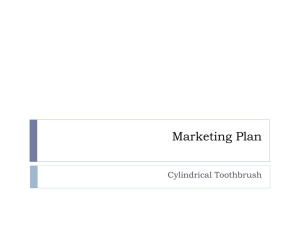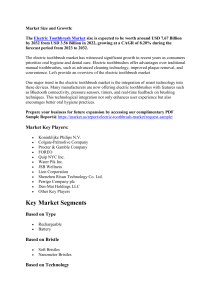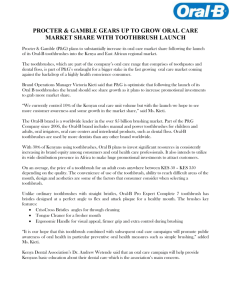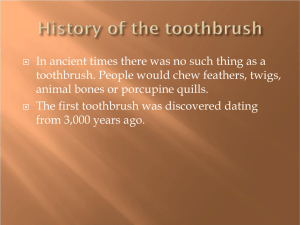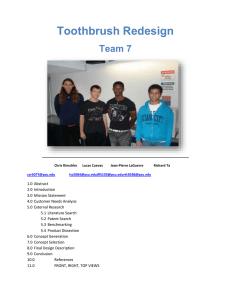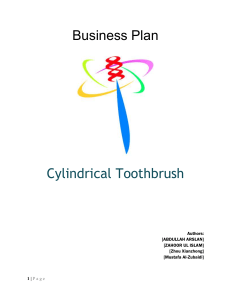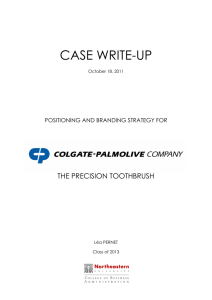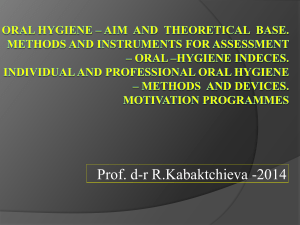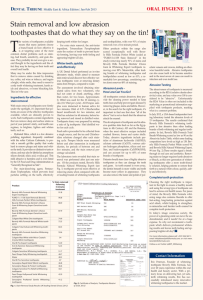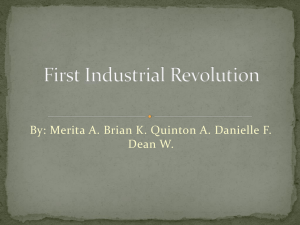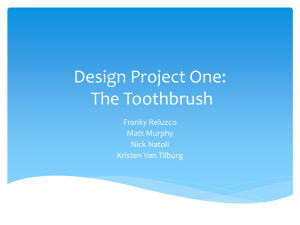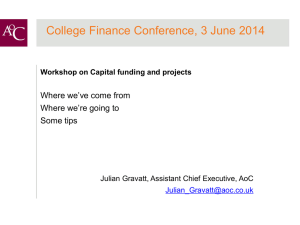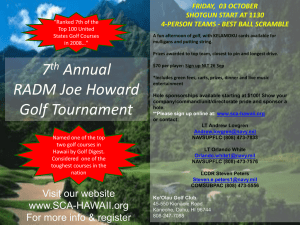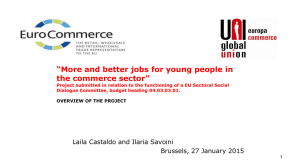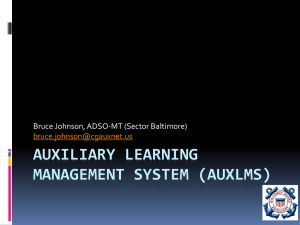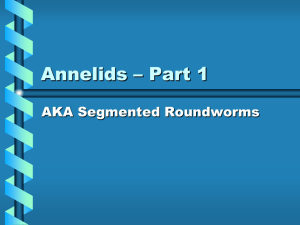Project 1
advertisement
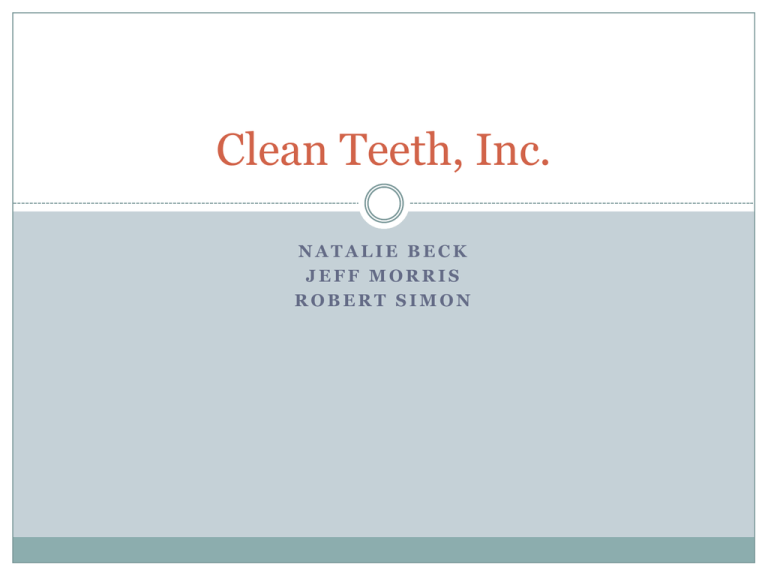
Clean Teeth, Inc. NATALIE BECK JEFF MORRIS ROBERT SIMON Part 1 PRODUCT DESCRIPTION Product Description We will make a toothbrush with a curved handle, shaped bristles, a grip for comfort, and a bristle indicator. Our toothbrushes will be uniquely colored as well. CBP Satisfaction Customer Service Website for Information Durability Product Safety Trust CBP Diagram Satisfaction Customer Service Website for Information Toothbrush Durability Trust Product Safety Part 2 STRATEGY DEVELOPMENT Strategy Development After scanning the environment, we found: Basic toothbrushes fall within a price range of $2 to $5 . Many toothbrush manufacturers have wellrecognized names. People of all ages use toothbrushes. Toothbrushes are made of plastic, nylon, and metal. Customer/Market Requirements Our toothbrushes must have a handle and bristles that stay intact during use. We must provide a toothbrush that is durable, semi- attractive, and competitively priced. Market Opportunities Everyone needs one! Input materials are inexpensive and easy to obtain. Main Competitors Oral B Colgate In existence since 1950 Founded in 1806 Used by more dentists Products are sold in and consumers than any other brand over 200 countries and territories Market Threats Brand recognition Experience To overcome customer loyalty, we will need to make nice looking, well featured toothbrushes that are less expensive. Part 3 MISSION & VISION STATEMENT Mission and Vision Statement Mission Statement To help people keep their teeth clean and healthy with our affordable, high quality toothbrushes. Vision Statement We hope to make strides toward decreasing the occurrence of dental illness with the use of our toothbrushes. Corporate Strategy We will make toothbrushes for everyone. Our core competencies will be a sole focus on toothbrushes, a good relationship with our suppliers, and a creative/cost-effective work force. Business Strategy We will concentrate on low cost and high quality. Because we will only be making toothbrushes, we can buy supplies in bulk at lower prices. We will also be able to utilize our creative work force to make attractive, high quality products that are affordable. Part 4 DISSATISFIERS , SATISFIERS, AND EXCITERS/DELIGHTERS Satisfiers/Dissatisfiers Satisfiers Dissatisfiers Easy Grip Handle Bristles Brush Indicator Handle Shaped Bristles Durability Cleans Teeth Exciters/Delighters Outstanding price for amount of quality Unique colors Part 5 CONCEPT DEVELOPMENT Concept Development We realized that dental hygiene companies with brand recognition often make a variety of products. If we focus on just toothbrushes, we can provide comparable quality at a lower price, while still making a nice profit. Manufacturing Steps Melt plastic pellets Inject melted plastic into toothbrush mold Place rubber grip on top of melted plastic Filling machine combines bristles and wire, then injects into melted plastic Bristles are then trimmed Each toothbrush falls into package Package is then sealed Toothbrush Equipment Packaging Equipment Financial Outlook Fixed Costs Variable Costs Mortgage Nylon, Plastic, Rubber, Equipment Costs and Metal Labor Salaries Taxes Utilities Insurance Break Even Analysis Fixed Costs = $51,500,000 Variable Price/brush = $1.50 Sales Price/brush = $2.50 BE Point: Q = __FC__ = 51,500,000 = 51.5 mil. SP - VC (2.50 – 1.50) BE Time Table Year 1 – 50.6 mil. brushes (.9 mil. behind) Year 2 – 53.7 mil. brushes (104.3 mil. total – we have broken even plus some) We will make money near the end of year 2. We will continue to make a profit in future years if we produce more than 51.5 mil. brushes annually. Preliminary Design and Testing Curved handle with grip for comfort Bristles shaped for nooks and crannies Unique colors Testing done on focus groups to determine likes/dislikes. Resources and Equipment Needed Resources Machinery Molding machinery Labor Bristle Injector Plant machinery Trimming machinery Packaging machinery Warehouse Input Materials Part 6 FORECASTING DESIGN Colgate Revenue for 2005-2007 Colgate Revenue y = 2265.1x - 8E+07 R² = 0.9999 $12,500,000.00 Total Revenue (in thousands) $12,000,000.00 $11,500,000.00 $11,000,000.00 $10,500,000.00 $10,000,000.00 $9,500,000.00 2005 2006 Years 2007 5 Year Forecast Using Linear Regression 5 Year Forecast for Colgate Revenues y = 2384.8x - 8E+07 R² = 0.999 $18,000,000.00 Total Revenue (in thousands) $16,000,000.00 $14,000,000.00 $12,000,000.00 $10,000,000.00 $8,000,000.00 $6,000,000.00 $4,000,000.00 $2,000,000.00 $2005 2006 2007 2008 2009 Years 2010 2011 2012 Forecasting Method 38% of Colgate’s total revenues are comprised of oral care products. According to our test marketing, we estimated that we could capture 1% of Colgate’s oral care market. This would be equivalent to 50.6 million toothbrushes in our first year and 53.7 million in our second year. Accuracy Check Year Forecast Revenue Actual Revenue Abs Deviation 1 $50,567 $50,567 $0 2 $53,708 $53,909 $201 3 $56,850 $57,522 $672 4 $59,992 $60,005 $13 5 $63,133 $64,285 $1,152 MAD 407.70 MAPE 0.68% TS 5 Utilize Seasonal Forecasting People buy toothbrushes year-round, without regard to a particular season. Therefore, we will not utilize Seasonal Forecasting. Part 7 PRODUCTION CAPACITY Production Capacity Our average forecasted sales for the first five years are million toothbrushes. Our current facility is capable of producing 22 mil. toothbrushes per year. This means that 91.8% of our capacity is being utilized. We reserve some unutilized capacity for unexpected or sudden growth. Capacity If sales are as forecasted, we will maintain 91.8% utilization by adding machinery capable of producing 1.4 million additional units per year each year. This will allow our capacity to reach 27.6 million toothbrushes per year by the fifth year. With forecasted sales of 25.3 mil. in 2012, this capacity will allow us to maintain our 8.2% reserve capacity for unexpected growth. Inputs and Outputs We will use multifactor productivity (MFP). MFP = ___Price of Toothbrush___ Labor Cost + Materials Cost = $2.50____ = 1.67/toothbrush ($1.00 + $0.50)
